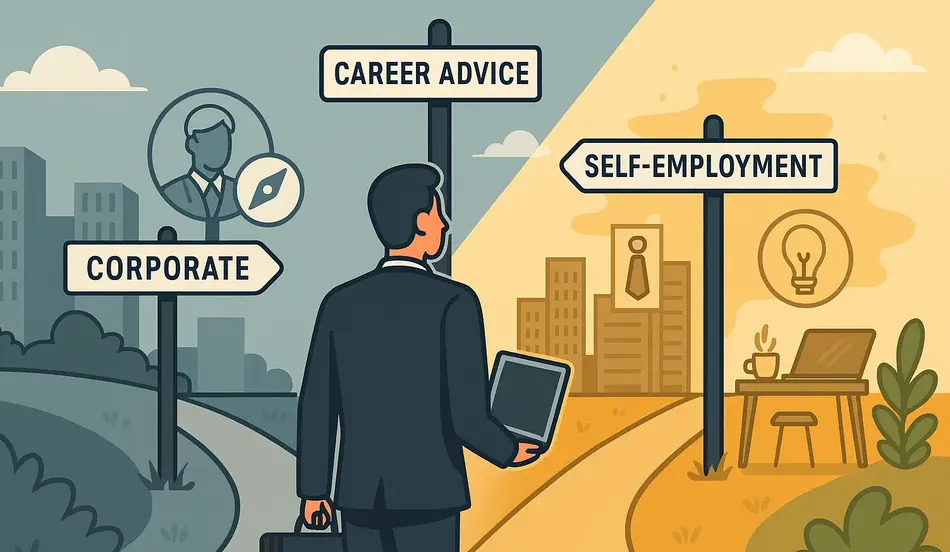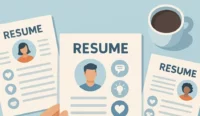Many young professionals feel trapped between conflicting voices: well-meaning family and friends urging them to “play it safe,” employers discouraging side hustles, and their own desire to break free from unfulfilling work. If you’re questioning your career direction, especially if you’re considering a pivot into something more flexible and sustainable, you’re not alone.
This article unpacks several key lessons drawn from real career dilemmas: why family and friends often give poor career advice, how to balance stability with ambition, what it takes to make a career switch into fields like accounting, and why the most successful people learn to do both—maintain security while building freedom.
Why Family and Friends Often Give the Wrong Advice
Family and friends usually mean well, but they are rarely the best sources of career guidance. Their advice is often shaped by their own limited experiences, fears, and biases.
- They want you safe, not fulfilled. Most parents or relatives will push you toward the most secure, conventional path because it makes them feel comfortable—not because it fits your goals.
- They project their own struggles. A parent who never took risks may tell you to “stick with your corporate job,” even if that job is draining your energy and potential.
- They lack context. Unless your family or friends are thriving in the specific career you want, they simply don’t have the expertise to give meaningful guidance.
The hard truth: if you want to build an extraordinary career, you can’t take advice from people living ordinary ones. Respect your family, but don’t let their fears dictate your future.
The Harsh Reality of Corporate America
Many new graduates step into their first corporate job expecting opportunity, mentorship, and growth. What they often find is bureaucracy, politics, and soul-crushing work.
Yes, corporate jobs pay the bills and help you build savings. But long term? They rarely deliver freedom or fulfillment. For many, two years in corporate America is enough to realize:
- Promotions are slow and often political.
- Innovation is stifled.
- You are always at risk of layoffs, regardless of performance.
That doesn’t mean everyone should immediately quit their jobs. Corporate roles can serve as a launch pad: a place to gain skills, earn money, and prepare for a more independent future. But if you stay too long, you risk getting stuck.
The Temptation of Playing It Safe
If you’ve saved aggressively, have marketable skills, and see a path toward independence, your biggest obstacle won’t be ability—it will be fear. Fear of losing stability, fear of wasting your degree, fear of disappointing family.
This is where the sunk cost fallacy traps people. They think:
- “I already spent years in IT (or finance, or engineering). Switching now would waste that effort.”
- “I went to school for this degree—I have to use it.”
The truth: a degree or past job is not a life sentence. If your current path feels like a dead end, it’s better to pivot now than remain stuck for decades.
Moonlighting and Career Pivots: Is It Worth the Risk?
Many professionals explore side hustles or second careers while keeping their main job. Employers often frown on moonlighting, but the reality is that testing new paths while keeping stability is the smartest way to transition.
Take accounting as an example. For someone in IT who craves independence and the ability to work remotely, accounting—especially tax work—is one of the most flexible, durable options available. The skills are in constant demand, the work can be done remotely, and it provides a clear path to self-employment.
Even if you never become a full-time accountant, learning tax and bookkeeping skills is never wasted. It improves your financial literacy, opens up side income opportunities, and gives you an exit plan if your corporate role disappears.
The Power of Doing Both
Too many people think career choices are binary: either stay in your current field or abandon it entirely. The truth? You can—and often should—do both.
That means:
- Keep your current job for stability and benefits.
- Study and train for your new career path in the evenings or weekends.
- Apply for new roles in both your existing field and your desired field.
Yes, this requires long weeks and late nights. For a period of time, you may work 70–80 hours per week. But this sacrifice is temporary. Within one to two years, you could position yourself for independence—far faster than if you stayed passive.
Doing both allows you to minimize risk while maximizing opportunity.
From IT to Accounting: A Practical Roadmap
Let’s use a real example: a young IT professional with $100,000 in savings who feels trapped in corporate work. They want independence, location flexibility, and meaningful work. Accounting provides that path.
Step 1: Education
- Explore becoming an Enrolled Agent (EA) or pursuing CPA qualifications.
- Consider affordable, accelerated programs such as Western Governors University.
Step 2: Experience
- Seek part-time or freelance tax preparation opportunities.
- If your current employer bans side work, start with education only until you can transition.
Step 3: Transition
- Once certified, work briefly for a small firm to gain credibility.
- Begin building your own client base—especially in specialized niches like expat tax.
Step 4: Self-Employment
- Launch your own remote tax practice.
- Focus on high-demand, low-automation services that require human trust and expertise.
Within five years, someone starting this journey could be living abroad, running their own firm, and serving clients globally.
Why Effort Still Matters
Technology has created the illusion that everything should be fast, easy, and automated. But nothing of real value—whether career success, financial independence, or personal fulfillment—comes without effort.
Effort gives meaning to achievement. It transforms knowledge into experience and builds the resilience you need to survive setbacks. If you want a life where you control your work instead of your work controlling you, there is no alternative: you must put in the hours.
Key Takeaways
- Don’t let family or friends hold you back with “safe” advice.
- Corporate jobs can provide stability but rarely freedom—use them as stepping stones.
- Career pivots aren’t wastes of time; they’re investments in your future.
- Side hustles and moonlighting, when done carefully, provide the smoothest path to independence.
- Success comes from doing both—maintaining stability while aggressively building the future you want.
FAQs
Q: Should I take career advice from family and friends?
A: Listen respectfully, but recognize their advice is usually shaped by fear and limited experience. Unless they’ve achieved the success you want, their input should not dictate your choices.
Q: Is it too risky to leave a stable corporate job?
A: Leaving without a plan is risky. But preparing a side path while working—education, freelancing, networking—reduces the risk dramatically.
Q: I spent years in my current field. Wouldn’t switching waste all that effort?
A: No. Past experience builds transferable skills. Even if you change fields, your discipline, technical knowledge, and work habits remain assets.
Q: Is accounting really a good career pivot?
A: Yes. Accounting, especially tax preparation, is in high demand, resistant to automation, and offers a clear path to remote and self-employment.
Q: How do I balance working full-time and studying for a new career?
A: By embracing the “do both” mindset. For one to two years, commit to long hours and sacrifice comfort. The payoff is the freedom to design your future.
Q: What if my employer bans outside work?
A: Focus first on education and certification, which cannot be restricted. Once prepared, seek a transition into a role or company that allows greater flexibility.
Final Word
The safe path—listening to family, staying in an uninspiring job, and avoiding risk—rarely leads to fulfillment. The bold path—building new skills, testing new careers, and working harder than most—creates options.
If you want a life of independence, purpose, and growth, the choice is clear. Don’t settle for either/or. Learn to do both.






